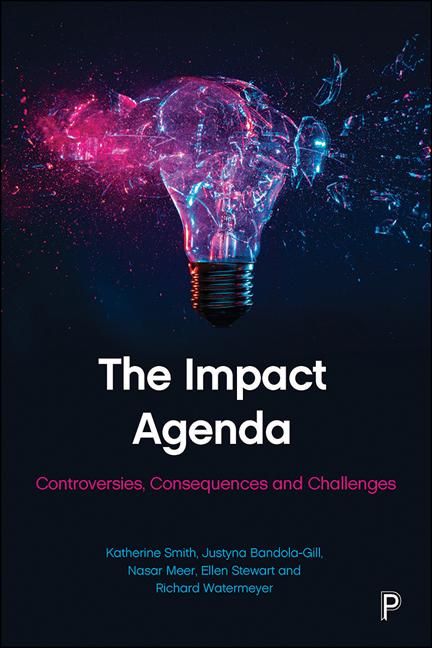Book contents
- Frontmatter
- Contents
- List of figures, tables and boxes
- List of abbreviations
- Notes on authors
- Acknowledgements
- 1 Introduction: Critical Reflections on Research Impact
- 2 The Rise of Research Impact
- 3 Debating the UK Impact Agenda
- 4 Do Experiences and Perceptions of Research Impact Vary by Discipline?
- 5 Impact on whom? Contrasting Research Impact with Public Engagement
- 6 Public Intellectualism and the Impact Agenda: International Perspectives
- 7 Academic Life in the Impact Vanguard: The View from Knowledge Exchange Organisations
- 8 Looking Back: Evolving Public Health Perspectives on Research Impact
- 9 Telling Tales of Impact: As Seen Through the Eyes of User Assessors
- 10 Conclusion: What Would an Evidence-Informed Impact Agenda Involve?
- References
- Index
5 - Impact on whom? Contrasting Research Impact with Public Engagement
Published online by Cambridge University Press: 23 February 2021
- Frontmatter
- Contents
- List of figures, tables and boxes
- List of abbreviations
- Notes on authors
- Acknowledgements
- 1 Introduction: Critical Reflections on Research Impact
- 2 The Rise of Research Impact
- 3 Debating the UK Impact Agenda
- 4 Do Experiences and Perceptions of Research Impact Vary by Discipline?
- 5 Impact on whom? Contrasting Research Impact with Public Engagement
- 6 Public Intellectualism and the Impact Agenda: International Perspectives
- 7 Academic Life in the Impact Vanguard: The View from Knowledge Exchange Organisations
- 8 Looking Back: Evolving Public Health Perspectives on Research Impact
- 9 Telling Tales of Impact: As Seen Through the Eyes of User Assessors
- 10 Conclusion: What Would an Evidence-Informed Impact Agenda Involve?
- References
- Index
Summary
As Chapter 2 showed, the current policy interest in research impact can be traced back to efforts to ensure that academic research provides a return on investment to the public purse. This agenda has risen alongside, and often rather separately from, a wider tradition of public engagement with, and in, academic research. The extent to which public engagement is seen as part of, or separate from, research impact appears to vary by discipline, as Chapter 4 discussed. This chapter explores the overlaps and elisions between these two fields of practice in more detail, comparing their articulation in guidance from research funders and regulators in the UK with how researchers from different disciplines describe the experiences, pressures and opportunities of each. We conclude with a brief reflection on continuing shifts in these unstable fields, as, in the UK, 2017's industrial strategy reorients research impact towards economic competitiveness.
Definitions: the relationship between impact and public engagement
It is not always clear or consistent what different actors seek to signify when they use the terms research impact or ‘public engagement’. Harmonising definitions of research impact between funders and evaluators of research, particularly with regards to public engagement, is one of the stated goals of REF2021 (HEFCE et al, 2017). The terms include distinct ‘targets’ (the public and, e.g., policy, practitioners or industry), and two ‘processes’ (impact versus engagement). These are contested terms; the notion of ‘the public’ (singular, coherent) is, in contemporary social science, almost always pluralised to recognise the dynamic and relational nature of societal groupings (Felt and Cochler, 2010; Newman and Clarke, 2009). There are other resonances and disagreements here: engagement implying a two-way process, impact seeming more didactic. However, the combinations that have come to dominate contemporary universities are for policy to be ‘impacted’ and ‘the’ public to be engaged.
The relative paucity of definitions of the term research impact in official guidance has been commented on before (Terama et al, 2016). By contrast, the work of the National Coordinating Centre for Public Engagement, an organisation funded by a consortium of HEFCE, UK Research Councils and the Wellcome Trust, has gone some distance to clarifying and harmonising definitions of public engagement. They have published a series of outputs which define and elaborate a considered and thorough definition.
- Type
- Chapter
- Information
- The Impact AgendaControversies, Consequences and Challenges, pp. 99 - 114Publisher: Bristol University PressPrint publication year: 2020



